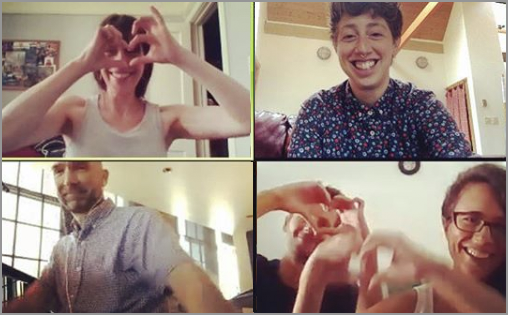Do you wear burnout as a badge of honor? Do you assume that burnout is inescapable for multipotentialites? After years of molding myself into a paragon of hustle culture, I’m retiring from the lifestyle. Instead of chasing more work until I work myself into a shame-fueled crisis, I have made a commitment to ending burnout in my multipotentialite life once and for all. Here’s why I want you to join me.
What is burnout, and where does it come from?
If you’re reading this, you have probably felt “burned out” yourself or heard others use a similar phrase. Emilie Wapnick has already provided us with a great exploration of multipotentialite burnout, so I’ll add my interpretation of the research on Freudenberger’s original 1974 conceptualization of burnout. You might be experiencing burnout when you feel:
- Completely depleted of your normal energy reserves
- Mentally distanced from your job, or increasingly concerned about avoiding negative outcomes more than achieving positive outcomes
- That you’re working harder and longer, but getting less done.
Emilie explains that multipotentialites are prone to experiencing burnout “more frequently and more intensely” because of “how passionately curious we are, and how easy it is for us to lose ourselves in our projects.” I appreciate Emilie’s phrasing here because it is authentic to the multipotentialite experience.
In other spaces, I’ve seen burnout conceptualized as a problem for people who feel driven to take on too many things because of an unhealthy compulsion to achieve, a melancholy desire to escape their present-day reality, a burdensome sense of duty to share all their gifts, or a practical need to save for retirement. But the road to burnout doesn’t usually look like that for multipotentialites.
Most of the time, us multipotentialites are happily motivated to explore multiple interests simultaneously because of the many passions we possess at the same time. That leads to a lot of work—paid or otherwise. And, no matter how good it can feel to do that work, it puts us at a higher risk for burnout in the long run.
It can be really difficult for us to find the right balance in our lives. I wonder if you’ve ever experienced anything like this:
I had finished writing an article about reaching a balance of pursuing multipotentialite interests that filled my cup without draining my soul. I declared my life to be a very good life. And it was! Then, almost immediately, my cup started to overflow.
“Escaping the Shame Spiral as a Multipotentialite“
I went from loving all of my work to feeling oppressed and overwhelmed by it, seemingly overnight. I hit burnout very hard that month, and it wasn’t the last time.
Jennifer Moss writes that the 6 root causes of burnout are:
- Unsustainable workload
- Perceived lack of control
- Insufficient rewards for effort
- Lack of a supportive community
- Lack of fairness
- Mismatched values and skills
Now here’s where I offer you a challenge: Will you wait until burnout compels you to take drastic—but temporary—actions to escape burnout one more time, or will you commit to something more permanent? If you’re staring down yet another exhausting, overwhelming episode of burnout right now, will you take a personal antidote to burnout that can banish it for life?
Psychological health & safety can prevent workplace burnout
When I looked at the 6 root causes of burnout, I noticed that they matched up nicely with 6 factors of workplace psychological health and safety. You might call these the 6 antidotes to burnout at work.
Three of these antidotes—Organizational Culture, Psychological Protection, and Civility & Respect—are what I call systemic, institutional, or cultural antidotes. These are vitally important…and may be way above your pay grade. So today I want to focus on three personal antidotes that can help us recover from burnout, and keep it from coming back.
Personal Antidote #1: Workload Management
The antidote to an unsustainable workload is workload management. Imagine a life where you can say:
- The amount of work I’m expected to do is reasonable for my position, and I can speak honestly with my supervisor about it.
- My work is free from unnecessary interruptions and disruptions.
When I’m navigating a crisis, I find it easier to create the conditions where these are true. I work up the nerve to have an honest conversation with my supervisor where I admit that I have too much on my plate. I ruthlessly cancel less-than-crucial meetings, and hang a sign outside my door that says that I am engaging in “deep work.” I finally start saying no to more paid work so that I can make room again to say yes to my hobbies. And then I regain that beautiful multipotentialite balance once more.
But I’m tired of relying on a crisis to finally do what’s necessary to make my workload manageable again. My personal goal for this antidote is to make these changes without needing a crisis to justify them. What’s one change you can make to manage the pace or volume of a multipotentialite workload that is burning you out?
Personal Antidote #2: Involvement & Influence
If your work life is feeling totally out of control, your antidote is involvement and influence. Here, your goal is to be able to say things like:
- I have control over how my tasks and responsibilities are prioritized and organized.
- I am encouraged to participate in decisions that impact my work.
This can be tricky, whether you are your own boss or not. If someone else is in charge of your multipotentialite projects, look for articles about managing up, saying no, or setting boundaries at work. If you only report to yourself, the problem isn’t others making decisions for you. Instead, you might be feeling adrift trying to figure out where to begin among too many competing priorities. “What’s one prioritization strategy you can use to take back control of your multipotentialite life?”
Personal Antidote #3: Recognition & Reward
Feeling insufficiently rewarded for the effort you put into your work is an expressway to burnout. Its antidote is, unsurprisingly, recognition and reward. But let me tell you why this can be less straightforward for a multipotentialite.
If you’re anything like me, you probably have a complicated relationship with what it means to be “rewarded” for your effort. I still have a sign on my home office desk that says “If You Love What You Do, You’ll Never Work A Day In Your Life!” Many of us pursue multipotentialite passions for the intrinsic reward of doing them, and I meet way more undercover multipotentialites than ones who do it for some kind of award or recognition. But take a look at the statements that go along with this antidote:
- I am paid fairly for the work I do.
- My employer—including my direct supervisor—shows appreciation for the effort, commitment, and passion I demonstrate for my work.
- My organization celebrates our shared accomplishments.
Can you see what might be causing the burnout for you?
You may feel incredibly fulfilled by your multipotentialite pursuits, but you struggle to make ends meet. That requires an incredible amount of resilience that can wear on you after a while. Or maybe you have your basic financial needs covered, but you’re one of those undercover multipotentialites I mentioned: It may not come naturally to you to share what you create with the world because praise has never been important to you. I want you to consider that there is something magical about allowing people to appreciate your gifts alongside you.
Perhaps your multipotentialite talents have you feeling like a cog in the wheel who doesn’t get recognized for how much you contribute to another person’s final product. Or maybe you’re on a team or in a family that has always saved their praise for ‘big wins’. Your personal antidote is to celebrate your small wins and honor the effort you put into your multipotentialite projects, regardless of the final outcome.
How can you use your voice to ask for what you need?
Pursuing many kinds of work as a multipotentialite can be incredibly satisfying. But that satisfaction can be followed by a terrible amount of pain when we pursue the work at the expense of our health. We can stop getting caught in endless cycles of burnout and recovery when we pursue the prioritization of our psychological health and safety with the same zeal we bring to our multipotentialite passions.
I’ve learned that taking bold actions to create the life we want involves taking equally bold actions to make it a healthy one. For you, this might mean using your voice in a new way to keep your workload manageable, prioritizing your projects, and ensuring that you are recognized for the value you bring to the world.
Will you accept the challenge?
Your turn
Which burnout antidote will you take today? If you are a leader or decision-maker, how might you help other multi-passionate folks stop repeating endless cycles of burnout and recovery?

Doing/being/exploring ALL THE THINGS is easier with a community!

Did you know we have a private community of hundreds of multipotentialites from around the world? We support each other, share advice and cheer each other on as we building lives and career around ALL our passions.
Learn more about the Puttyverse and get notified next time we open the doors:


I feel this to my bones. I am thoroughly appreciated in my day job and my volunteer/side projects, but that usually just means more work for me (and my team). As I write this I know that I have said no to some projects but yes to others and even gotten more people(volunteers) to come and help (plus new hires). I am learning to accept that perfection is not a goal. I think the ADHD on top of multi life makes it hard for me to say no to the sparkly thing(new project). Goals for 2023, right?
Gabriela, it’s like you read my mind! My next article describes three reasons to say no, so we can both work on that goal for 2023. I agree that it’s a much better goal that perfectionism, because being perfect is 100% impossible to achieve! I’m glad this article resonated with you.
What strategy are you currently exploring to help you say no to that next sparkly thing?
Thanks Mel, this is a great article. I plan to share it with my students this coming semester to help their thinking about strategies for self-care and self-management.
Dear Jo, I’m so honoured that you would choose my article to share with your students!
What do you teach, and what do you find that your students struggle with the most when it comes to self-care and self-management?
I’m reading this as I am struggling to finish up leg warmers for my mom. Ways it’s done seemed as too much effort and too much time I lacked so I started doing them my way. And she is not impressed by that way, how it’s turning out and it makes me even less motivated to finish it. Most on this world I hate is giving up so probably just will post pone it until I feel like doing it again. Thank you for the article, I think if I keep pushing this further I will definetly slide into burnout and that is far from what I need as recently unemployed person 🙂